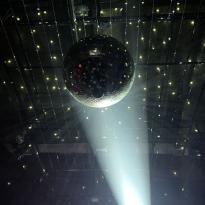8:00 AM My alarm goes off and I hit snooze one more time before waking up for my nine am class at the IES Abroad center.
8:30 AM I eat a quick breakfast of toast with cream cheese and café con leche before heading to the bus stop. Buses here can be a bit unpredictable, and today I’m less than a block away when I see my bus pass by. There’s no use in running, so I wait for the next one and make sure to stick my arm out as it passes by so that they stop.
9:00 AM Spanish class. There are five of us in this class, and we typically spend our time going over grammar concepts and chatting with our professor, Natacha, about whatever comes up. Today, we create an imaginary non-profit and stage an interview. There are always lots of giggles in this class, and I think that having such a small group and an informal structure has been really helpful.
11:00 AM Spanish ends and Argentinian Literature begins. It’s a bit tough having these two back to back, but this is one of my favorite classes. Today, we have a visitor: author Sylvia Iparraguirre. We’ve read a few of her short stories already, and it’s really interesting and exciting to hear her talk about her stories and about writing more generally. Although I usually can’t understand all of the Spanish being spoken in class, I still love hearing her thoughts on the writing process, her story inspiration, and her ideas about Argentina and Argentine identity.
12:30 PM Class is over, and a few friends and I head over to a nearby Korean place for lunch. There are a lot of good restaurants near the IES Abroad center; today I order a bulgogi bowl to-go and bring it back to the center to eat with everyone else. After a leisurely lunch on the terrace, it’s time for one last class.
1:30 PM The Making of Patagonia. At three hours, this is my longest class but also one of the most interesting. Last week, we each chose an Argentine to interview on their thoughts about the Patagonia region. We’ve been talking a lot about the Indigenous people of the region, and it’s interesting to hear what different people had to say about the Patagonian landscape and its people. There are lots of varied responses and ideas from people’s interviews, and we discuss some common misconceptions about Patagonia and Indigenous people in Argentina more generally. One point that comes up frequently centers around Indigenous erasure and the myth that "los Argentinos descienden de los barcos" (Argentines descend from the boats).
4:30 PM A full day of classes over, I head to a nearby café for a cappuccino and an alfajor (an Argentinian cookie with caramel-esque dulce de leche, sometimes covered with chocolate). Service here tends to be more leisurely than in the United States, and there are an abundance of cafés that offer both coffee and a full menu of sandwiches, salads, and baked goods. I like the slower pace—I don’t feel rushed, and people are more relaxed about timing.
5:30 PM After coffee, I head home on the bus. I take the 108, around the corner from the IES Abroad center. Recently, I’ve been taking the bus a lot more often and it feels good to understand the public transportation system better. At home, I chat with my host parents about our days for a few minutes before heading to my room for a nap. I nap nearly every day here; the days are full and language immersion is hard. Still, I feel like I’m doing and learning so much. I’m a month in now, and in the past week or so I feel like I’ve begun to turn a corner with my Spanish. I don’t feel completely lost in every class, and I can usually somewhat navigate conversations at restaurants and stores. Still, some moments humble me: last weekend, I started telling the waiter that I'm an exchange student from the United States after he asked me how I wanted my meat done.
9:00 PM Dinner time. In the evenings, everything happens a bit later here: people eat dinner around nine or ten, and if you’re going out, most clubs don’t open until at least midnight. It took me a minute to adjust to the schedule, but now I really like how it allows the day to stretch on uninterrupted. Also, it means that I can always get a nap in before going out. Tonight we’re eating Milanesa, a very typical dish in Argentina which consists of breaded slices of meat, usually either chicken or beef, with a squeeze of lemon on top. There are also vegetarian versions that are made with eggplant. I have mine with mayonesa con limón and broccoli on the side. After a dessert of banana with dulce de leche, I help clear the table and start to figure out my plans for the night.
11:00 PM My friend taxis over to me and we get ready for the evening before heading to Niceto Club. We do a bit of a clothing and shoe swap, which is helpful since my own wardrobe is limited, and then pick up another friend in the taxi on the way to the club, where there’s a party tonight for international students. The crowd is a bit thin at first, but it quickly fills up as it gets later. The music hops from Britney Spears to Rosalía to reggaeton, and we dance for hours before ending the night with a McDonald's run (even across the world, some things never change).




Isabel Rameker
I'm a junior sociology and anthropology major at Carleton College in Minnesota. I'm also a prospective Spanish minor and I'm both excited and nervous to dive into a semester of Spanish immersion in Argentina. Although I go to school in a small town, I love cities and am endlessly fascinated by their different cultures and dynamics, so I'm especially excited to be living in Buenos Aires this fall. At school, I play club frisbee and write for my college's news site, and in my free time, I love to lounge with a good book, cook meals with my housemates, and enjoy the outdoors.









